AIIM 2023 State of the Intelligent Information Management Industry
20. April 2023 16:46 Uhr | Dr. Ulrich Kampffmeyer | Permalink

Die AIIM Association for Intelligent Information Management international hat ihre jährliche Studie herausgebracht: AIIM 2023 State of the Intelligent Information Management Industry. Von den über 530 Befragten waren 69% AIIM-Mitglieder – somit mit der Materie vertraut – und 31% keine AIIM-Mitglieder. Die überwiegende Mehrheit, rund 75% kam aus den USA. Daher hat die Studie für andere Länder leider wenig Relevanz. Die Studie seht kostenfrei im Download zur Verfügung – nach Hinterlassen der Adress- und Kontaktdaten: https://bit.ly/AIIM_IIM_2023. Ein Einführung in die Ergebnisse bietet der englischsprachige Vortrag von Dave Jones, der als Video abgerufen werden kann: https://www.youtube.com/watch?v=HJ1sTjdTQL8.
In unserem Blog-Beitrag wollen wir nur einige wesentliche Ergebnisse herausgreifen. Zum Vergleich, die Besprechungen der AIIM State-of-the-Industry-Berichte von 2022 (https://bit.ly/AIIM_IIM2022) und 2021 (htps://bit.ly/AIIM_IIM_2021).
Die AIIM international hat sich erst relativ spät vom alten Branchenbegriff „ECM Enterprise Content Management“ verabschiedet. In den letzten fünf Jahren fand die Umorientierung auf IIM Intelligent Information Management statt. Erstmals 2018 wurde die Studie unter dem Titel „Intelligent Information Management!“ publiziert.

Der Report setzt die jährliche Reihenfolge der Marktuntersuchungen der AIIM fort. Rund ein Drittel der 44 Seiten im Folienformat sind Beiwerk oder Werbung. In vier Abschnitten – Key Findings (Seite 8), Introduction (Seite 10-12), The State of the Industry (Seite 14-22) und Conclusions & Recommendations (Seite 29) – werden die Ergebnisse der Befragung mit Grafiken und Tabellen dargestellt. In zwei Anhängen gibt es die demografischen Informationen zu den Teilnehmern an der Befragung und ausgewählte Kommentare.
In Bezug auf die Ziele der Studie und die Definition des Marktsegmentes schreibt AIIM:
<Zitat> For years, organizations aspired to realize the full promise of Enterprise Content Management (ECM) with its electronic document capture, storage, and processing — and many got there. More recently, those same organizations have been striving towards digital transformation to digitalize their businesses completely. COVID-induced market factors forced that shift sooner than expected. Yet, as we all emerge from the pandemic, organizations face new challenges, such as data privacy, cybersecurity, hybrid workforces, labor shortages, and advances in artificial intelligence.
This places us all at a practical and philosophical crossroads:
Where should we focus resources to get the best out of technology, processes, and people?
In this 2023 State of the Intelligent Information Management Industry report, we use user-generated intelligence to uncover the realities of post-pandemic information management and its impact on current industry and economic forces.
For the first time, our research has gone beyond the AIIM community to include responses from the wider business world. By combining the feedback from both the AIIM and non-AIIM audiences, we provide a clear picture of the information-driven direction that organizations are charting, the alignment (or lack of) across the organization with business goals/values, and what this means for the future of our industry.“
„The information management landscape is constantly changing, as are the terms used to describe it. For example, the discipline that started as archiving via microfilm has since transformed through terms such as document management, enterprise content management, and, more recently, content services platforms.“ </Zitat>
Ausgewählte Ergebnisse der Studie
In der Keyfindings werden dabei 10 wichtige Einzelergebnisse herausgehoben.
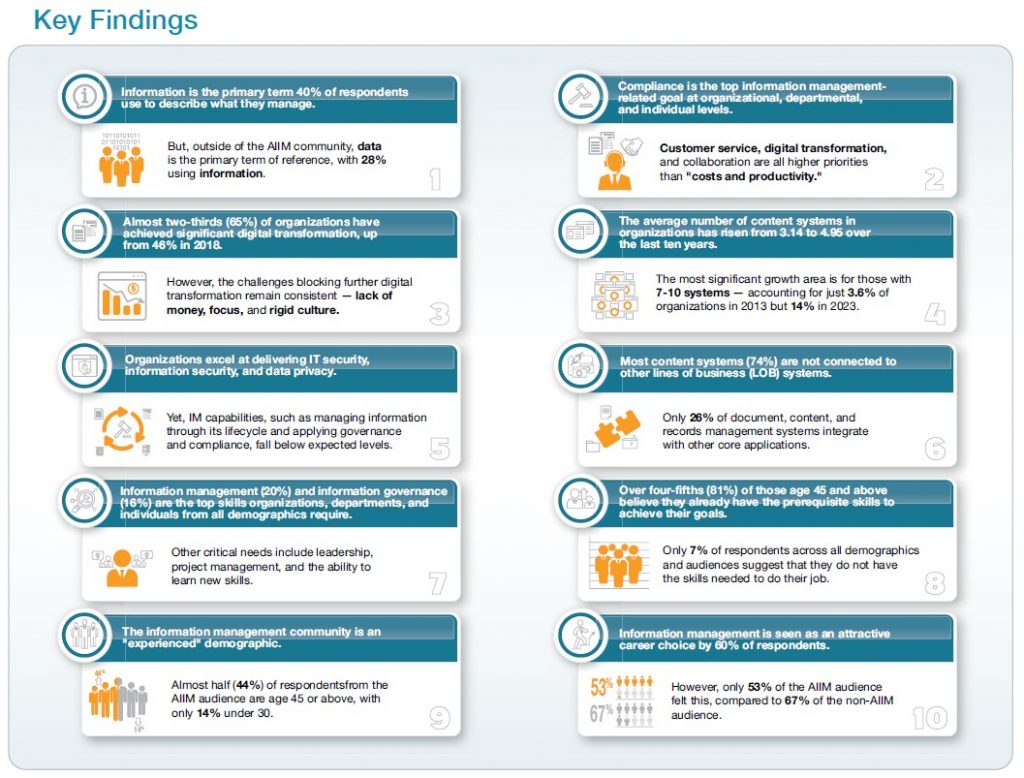
Die Teilnehmer:innen sehen sich dabei eher im Fachgebiet Informationsmanagement oder Records Management denn bei den alten Branchen-Termini ECM oder Content Services zu Hause. Ein klare Ausrichtung auf Information Management ist mit mehr als 40% gegeben.
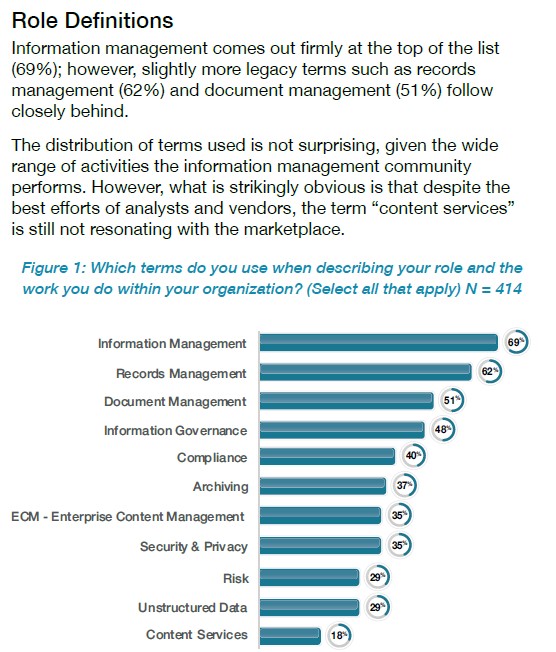
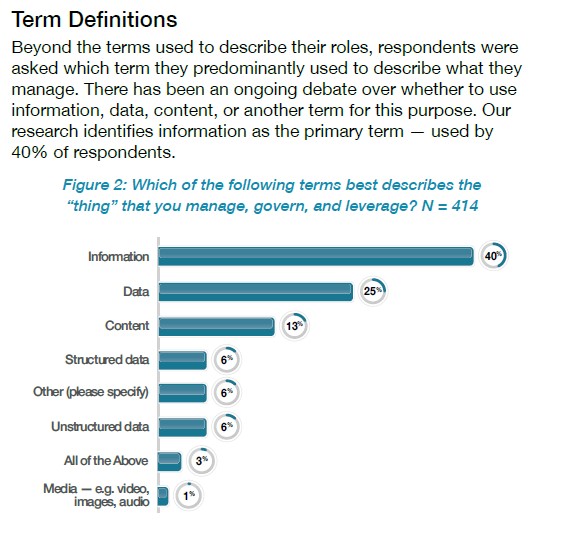
Innerhalb der AIIM Community wird dabei eher von Information gesprochen, wohingegen die Teilnehmer:innen von außerhalb AIIMs eher von Daten sprechen.
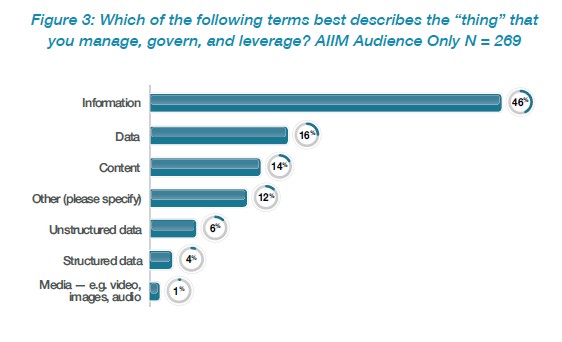
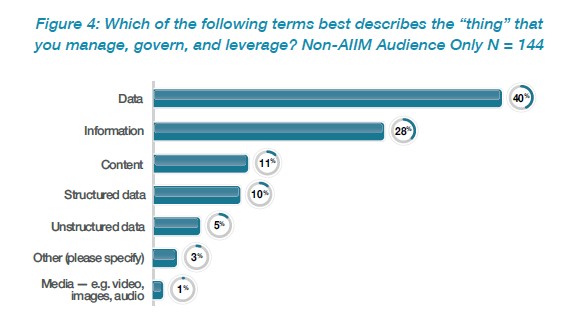
Der Anteil der Unternehmen, die wesentliche Umsetzungserfolge bei der Digitalisierung vorweisen können, ist stark gestiegen. IT-Sicherheit, Erfüllung von Compliance-Vorgaben und Information Governance sind wichtige Themen. Bei den Einzelthemen finden sich die „üblichen Verdächtigen“ mit Compliance, Customer-Service etc. Aber das Thema Digital Transformation gewinnt an Bedeutung.
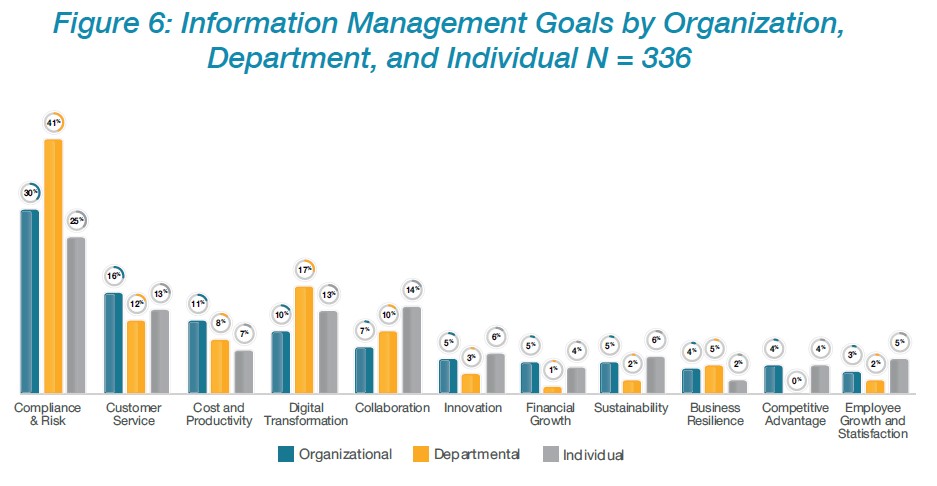
Jedoch zeigt sich bei der Abfrage der Umsetzung der Ziele mit Werkzeugen etwas erstaunliches. Es werden eher traditionelle Technologien genutzt und die modernen Ansätze wie AI, ML, RPA etc. nicht zum Informationsmanagement eingesetzt. Dabei ist Automatisierung ein wichtiges Thema.
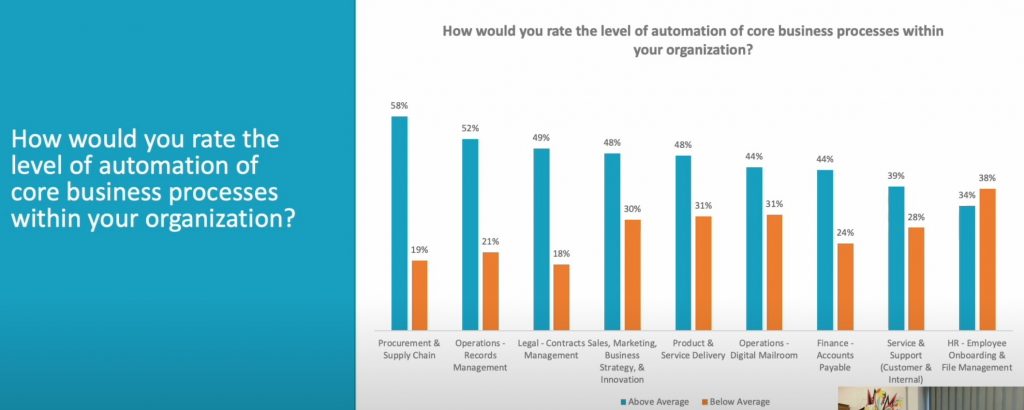


Vieles an unterschiedlichen Informationen ist auch noch in anderen Anwendungen, einzelnen Inseln, gespeichert und verwaltet.

Die Integration von Informationsmanagement mit anderen Anwendungen ist immer noch eine „offene Flanke“, wo Nutzenpotentiale verschenkt werden. Der Anteil der Systeme, die mit anderen Anwendungen integriert sind, ist mit 26% sehr gering.

Insgesamt liegen die Schwerpunkte des Einsatzes von Informationsmanagement-Werkzeugen bei den bisherigen Themen der Branche. Analytics und Automatisierungsansätze schieben sich erst langsam nach oben. Vielleicht liegt es aber auch daran, dass die moderneren Technologien bei der Befragung nicht als Optionen zur Auswahl angeboten wurden. Bemerkenswert ist, dass sich Elektronische Signaturen in Bezug auf geplante Nutzung erheblich verbessern konnten. IDP, Intelligent Document Processing, modernisiert die bisherigen Capture-Anwendungen.
In Bezug auf die Menge unterschiedlicher Systeme bei den Befragten ist immer noch ein Chaos festzustellen, wo mehrere Lösungen parallel betrieben werden.
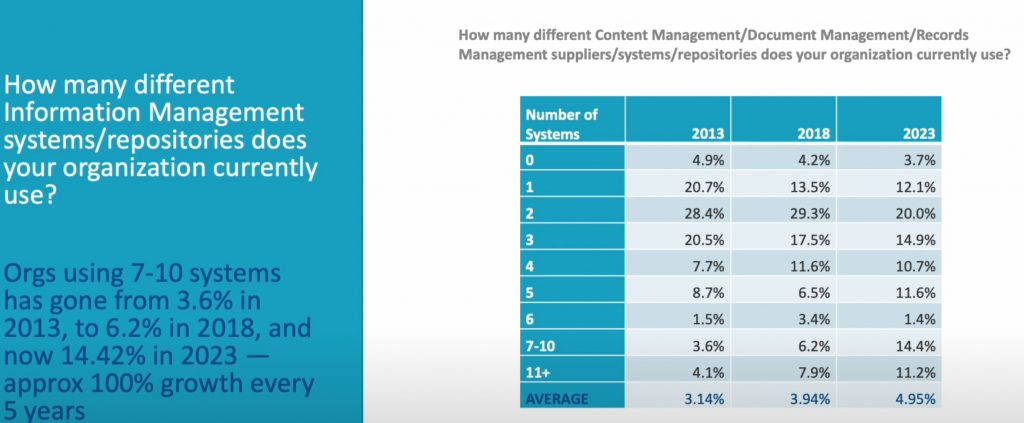
Weiterhin bestehen Unterschiede bei den vorhandenen und geplanten Lösungen. Hier sind – seit Corona? – interne Anwendungen zu Collaboration, sicherem Informationsaustausch, Informationsportale im Intranet und Records Management weit vorn.
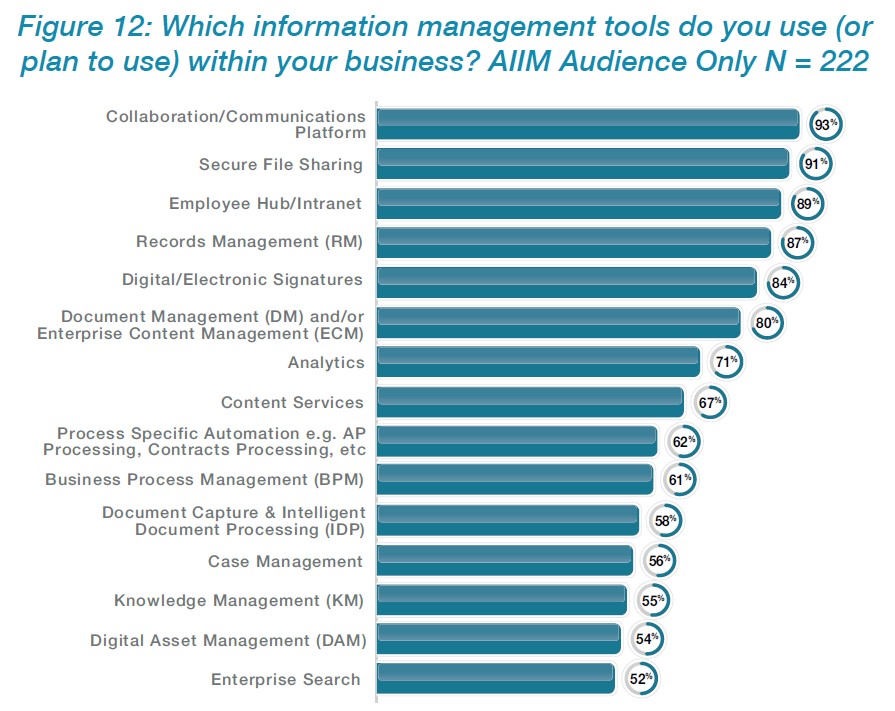
Zu den interessanten Ergebnissen gehören auch Initiativen zur Umsetzung von Informationsmanagement-Maßnahmen, die Umsetzung der Automatisierung bei den Kern-Geschäftsprozessen sowie die Themen Sicherheit und Datenschutz.
Bei den Umsetzungsmaßnahmen einer ganzheitlichen Informationsmanagement-Strategie geht es auch um die Modernisierung vorhandener Systeme, um Migrationen, den Abbau von Informationssilos und eine übergreifende Informationserschließung. Langzeitarchivierung steht dabei ganz oben auf der Liste:
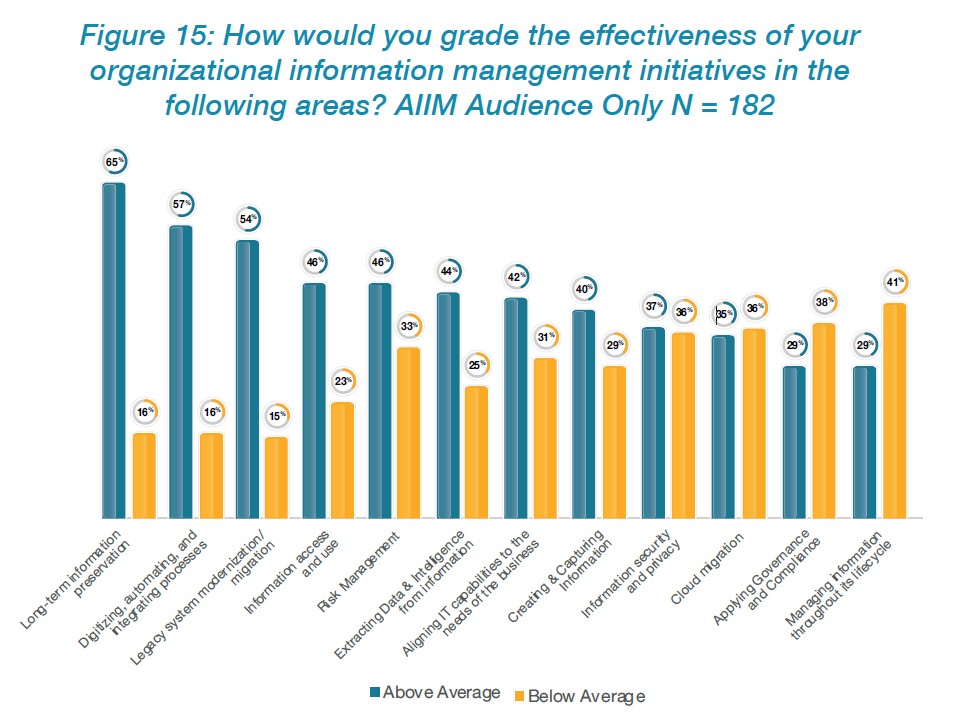
Bei der Automatisierung der Geschäftsprozesse ergibt sich weiter obiges Bild zum „Level of Automation in Core Business Processes. Finanz- und Abrechnungswesen, operatives Records Management, Vertragsmanagement, Vertrieb sowie Produkt-Bereitstellung & -Service sind gängige Themen der aktuellen Automatisierungsstrategien. Interessant ist es auch besonders im Bereich HR, der zudem auch besonders auf Compliance- und Datenschutzanforderungen Bezug nehmen muss. In der Frage ging es darum, in wieweit die Unternehmen bereits sich einschätzen, Datenschutz, Informationssicherheit und IT-Sicherheit umgesetzt zu haben.

Bemerkenswert im Ausblick „Looking to the Future“ ist die Anerkennung der stark steigenden Bedeutung von Information Management mit knapp 80%. Nur 1% glaubt, dass die Bedeutung von Informationsmanagement geringer wird. Um Information Management und Information Governance übergreifend, unternehmensweit umzusetzen, bedarf es nun entsprechender Stellen, Rollen und Organisationseinheiten sowie ausgebildeten Personals.
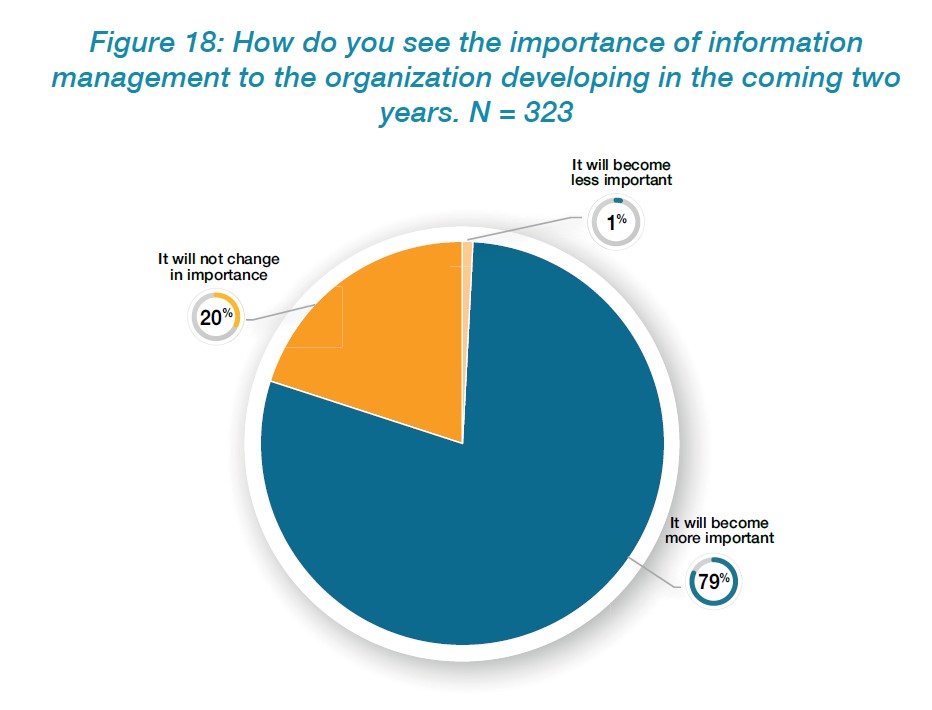
Bei den Organisationseinheiten und Stellen wird leider viel gespart. Und passendes Personal zu finden ist sehr schwierig.
Bei den Mitarbeiter:innen werden als notwendige Kenntnisse und Fähigkeiten Information Management und Information Governance am Häufigsten genannt. Dies ist bei PROJECT CONSULT schon das Credo seit 20 Jahren – es geht um ganzheitliches Informationsmanagement und Informationsbeherrschung. Es gilt hier Informationsmanagement-Strategien zu definieren, Akzeptanz und Visibilität in der Organisation zu stärken, Planungen konsequent und nachhaltig umzusetzen, Architektur, Berechtigungen und „Information Ownership“ zu verankern, und die kontinuierliche Umsetzung zu steuern.
Die Befragten sind offenbar fast alle bereits in der Branche beheimatet und so gibt es nur einen geringen Bedarf Neues für den Job zu lernen. In einem Abschnitt zur Stimmung in der Branche waren einzelne gezielte Fragen kurz zu beantworten – auch die Frage nach mögliche Karrierechancen im Informationsmanagement. Immerhin sieht ein Großteil der Studienteilnehmer:innen eine gute Attraktivität des Berufsbildes im Information Management.
Soweit so gut so positiv.
Auf einer Folie werden die Ergebnisse zusammengefasst und die Folgerungen gezogen <Zitat>:
Conclusion 1:
Digital transformation (DT) appears to have stalled. Yes, over 65% of organizations have achieved significant successes with DT, but that still leaves at least a third who have not. The difference between digitizing most of an enterprise and finishing the job is vast — if just one process still involves paper and manual handling it acts like the metaphorical thorn in the side of your department.
Recommendation 1:
Find a way to discuss Information Management at a higher level within the business. Aligning with topics such as cybersecurity and data privacy will deliver increased awareness and visibility. However, ensure that you do not focus only on the defensive aspects of IM, such as compliance and risk management; open the onversation to explore productivity gains, increased insight, and the broader value of good information governance.
Conclusion 2:
A metric that the industry returns to regularly is the number of information systems organizations use. As we have seen, the number keeps growing — up to 4.95 systems on average this year. The rise of IM systems appears to be both fuelling the information chaos within organizations and trying to solve the problem.
Recommendation 2:
Carefully evaluate the growth of content systems within your business. When a new system is introduced, ensure it is connected to a) the other information systems and b) other lines of business systems.
Conclusion 3:
The information management industry has an age demographic heavily biased toward those over age 30. To ensure the future success of the information management profession, we need new entrants to the workforce and clear and continued professional development for both new and established practitioners. Without both, this space will have a severe skills shortage within the next 5-15 years.
Recommendation 3:
Ensure that your organization is actively developing the next generation of IM professionals. Many of your existing team are a wealth of knowledge — identifying ways to share their experience with peers and newer hires and nurture their successors will be critical to ensuring long-term IM capabilities within your organization. </Zitat>
Im Anhang 1 mit den demographischen Daten der Studienteilnehmer:innen findet sich auch die Statistik mit den Regionen, aus denen Antworten eingereicht wurden. 73% kommen aus den USA & Kanada, 3% aus dem Vereinigten Königreich und 16% aus Europa und dem Nahen Osten. Hieraus jetzt Schlüsse auf die Situation des Informationsmanagements in Deutschland ziehen zu wollen, wäre vermessen. Die Ergebnisse können allenfalls als Anhaltspunkt für eigene Betrachtungen gewählt werden.
Im Anschluss des Anhanges mit den demografischen Informationen findet sich ein zweiter Anhang mit ausgewählten Kommentaren zu Fragen wie „Was bedeutet der Begriff Informationsmanagement für Sie?“ sowie eine umfangreiche Tabelle, in der die Zustimmung oder Ablehnung zu verschiedenen Thesen dargestellt sind:
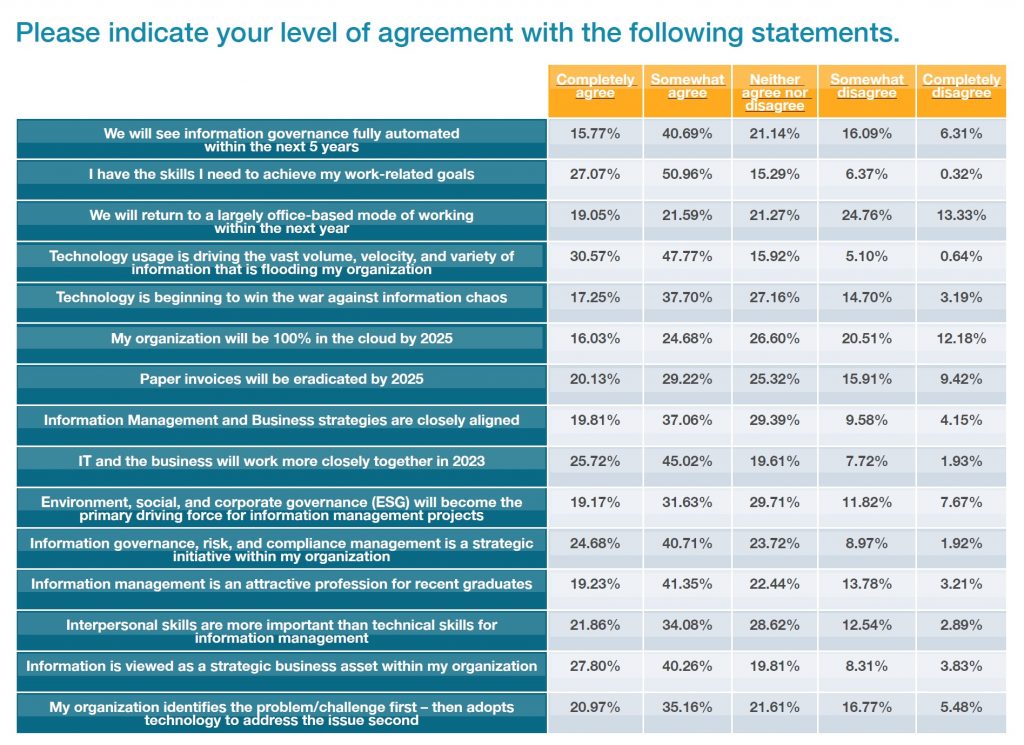
Hier finden sich dann Aussagen zur Cloud-Strategie, wie weit bereits die Umsetzung von Informationsmanagement-Strategien gediehen ist und ob Information Management bereits als wichtiges „Asset“ des Business angesehen wird. Es lohnt sich die einzelnen Fragen anzusehen und eine Einschätzung der eigenen Organisation im Vergleich zu den aufgeführten Antworten zu ziehen. Sie stellen die eigentlichen Trendaussagen der AIIM-Studie dar.
Auch wenn vieles in der Studie noch eng mit den alten Strategien von Enterprise Content Management verknüpft ist und moderne Technologien wie Artificial Intelligence, Analytics oder Maschinenlernen nicht herausragen, geben die Ergebnisse doch eine gewisse Hilfe bei der Einschätzung der Themen, die die Anwender im Markt für Informationsmanagement bewegen. Diese sind häufig realitätsnäher als viele Hype-Themen, die aktuell kursieren.
Translated by Deepl.com
AIIM Association for Intelligent Information Management international has released its annual survey: AIIM 2023 State of the Intelligent Information Management Industry. Of the more than 530 respondents, 69% were AIIM members – thus familiar with the subject matter – and 31% were not AIIM members. The vast majority, about 75%, were from the United States. Therefore, the study has little relevance for other countries. The study is available for download free of charge – after leaving address and contact details: https://bit.ly/AIIM_IIM_2023. An introduction to the results is provided in the English-language presentation by Dave Jones, which can be accessed as a video: https://www.youtube.com/watch?v=HJ1sTjdTQL8.
The report continues AIIM’s annual sequence of market surveys. About one-third of the 44 slide-format pages are ancillary or advertising. Four sections – Key Findings (page 8), Introduction (pages 10-12), The State of the Industry (pages 14-22), and Conclusions & Recommendations (page 29) – present the survey results with charts and tables. Two appendices provide demographic information on survey participants and selected comments.
Regarding the objectives of the study and the definition of the market segment, AIIM writes:
<citation> For years, organizations aspired to realize the full promise of Enterprise Content Management (ECM) with its electronic document capture, storage, and processing — and many got there. More recently, those same organizations have been striving towards digital transformation to digitalize their businesses completely. COVID-induced market factors forced that shift sooner than expected. Yet, as we all emerge from the pandemic, organizations face new challenges, such as data privacy, cybersecurity, hybrid workforces, labor shortages, and advances in artificial intelligence.
This places us all at a practical and philosophical crossroads:
Where should we focus resources to get the best out of technology, processes, and people?
In this 2023 State of the Intelligent Information Management Industry report, we use user-generated intelligence to uncover the realities of post-pandemic information management and its impact on current industry and economic forces.
For the first time, our research has gone beyond the AIIM community to include responses from the wider business world. By combining the feedback from both the AIIM and non-AIIM audiences, we provide a clear picture of the information-driven direction that organizations are charting, the alignment (or lack of) across the organization with business goals/values, and what this means for the future of our industry.“
„The information management landscape is constantly changing, as are the terms used to describe it. For example, the discipline that started as archiving via microfilm has since transformed through terms such as document management, enterprise content management, and, more recently, content services platforms.“ </citation>
Selected results of the study
In the keyfindings, 10 important individual results are highlighted.
The participants see themselves more at home in the field of information management or records management than in the old industry terms ECM or content services. More than 40% have a clear focus on information management.
Within the AIIM community, people tend to talk about information, whereas participants from outside AIIM tend to talk about data.
The proportion of companies that can demonstrate significant implementation successes in digitization has risen sharply. IT security, meeting compliance requirements and information governance are important topics. The „usual suspects“ with compliance, customer service, etc. are found among the individual topics. But the topic of digital transformation is gaining in importance.
However, when querying the implementation of the goals with tools, something surprising becomes apparent. More traditional technologies are used and the modern approaches like AI, ML, RPA etc. are not used for information management. At the same time, automation is an important topic.
A lot of different information is also stored and managed in other applications, individual islands,
The integration of information management with other applications is still an „open flank“ where potential benefits are given away. The proportion of systems that are integrated with other applications is very low at 26%.
Overall, the focus of the use of information management tools is on the previous topics in the industry. Analytics and automation approaches are only slowly moving up the list. However, this may also be due to the fact that the more modern technologies were not offered as options to choose from in the survey. It is worth noting that Electronic Signatures improved significantly in terms of planned usage. IDP, Intelligent Document Processing, modernizes previous capture applications. In terms of the amount of different systems among respondents, there is still chaos where multiple solutions are operated in parallel. Furthermore, there are differences in the existing and planned solutions. Here are – since Corona? – internal applications for collaboration, secure information exchange, information portals on the intranet and records management are far ahead.
Interesting findings also include initiatives to implement information management measures, the implementation of automation in core business processes, and the topics of security and data protection.
The implementation measures of a holistic information management strategy also involve the modernization of existing systems, migrations, the elimination of information silos and comprehensive information development. Long-term archiving is at the top of the list:
When it comes to automating business processes, the above picture of the „Level of Automation in Core Business Processes“ continues to emerge. Finance and accounting, operational records management, contract management, sales, and product provisioning & service are common topics of current automation strategies. It is also particularly interesting in the area of HR, which also has to make special reference to compliance and data protection requirements. The question was about the extent to which companies already consider themselves to have implemented data protection, information security and IT security.
A remarkable aspect of the „Looking to the Future“ outlook is the recognition of the rapidly increasing importance of information management at just under 80%. Only 1% believe that the importance of information management will decline. In order to implement information management and information governance across the entire company, appropriate positions, roles and organizational units are now required, as well as trained personnel.
Unfortunately, a lot is being saved in terms of organizational units and positions. And finding suitable personnel is very difficult.
With the employees:in as necessary knowledge and abilities information management and information governance are called most frequently. This is with PROJECT CONSULT already the credo for 20 years – it is about holistic information management and information governance. It applies here to define information management strategies, to strengthen acceptance and visibility in the organization, to convert planning consistently and lastingly, to anchor architecture, authorizations and „information ownership“, and to steer the continuous conversion.The asked ones are apparently almost all already in the industry native and thus there is only a small need new for the job to learn. In a section on the mood in the industry, individual targeted questions had to be answered briefly – including the question about possible career opportunities in information management. After all, the majority of the study participants see a good attractiveness of the job description in information management.
So far so good so positive.
A slide summarizes the results and draws the conclusions <citation>:
Conclusion 1:
Digital transformation (DT) appears to have stalled. Yes, over 65% of organizations have achieved significant successes with DT, but that still leaves at least a third who have not. The difference between digitizing most of an enterprise and finishing the job is vast — if just one process still involves paper and manual handling it acts like the metaphorical thorn in the side of your department.
Recommendation 1:
Find a way to discuss Information Management at a higher level within the business. Aligning with topics such as cybersecurity and data privacy will deliver increased awareness and visibility. However, ensure that you do not focus only on the defensive aspects of IM, such as compliance and risk management; open the onversation to explore productivity gains, increased insight, and the broader value of good information governance.
Conclusion 2:
A metric that the industry returns to regularly is the number of information systems organizations use. As we have seen, the number keeps growing — up to 4.95 systems on average this year. The rise of IM systems appears to be both fuelling the information chaos within organizations and trying to solve the problem.
Recommendation 2:
Carefully evaluate the growth of content systems within your business. When a new system is introduced, ensure it is connected to a) the other information systems and b) other lines of business systems.
Conclusion 3:
The information management industry has an age demographic heavily biased toward those over age 30. To ensure the future success of the information management profession, we need new entrants to the workforce and clear and continued professional development for both new and established practitioners. Without both, this space will have a severe skills shortage within the next 5-15 years.
Recommendation 3:
Ensure that your organization is actively developing the next generation of IM professionals. Many of your existing team are a wealth of knowledge — identifying ways to share their experience with peers and newer hires and nurture their successors will be critical to ensuring long-term IM capabilities within your organization. </citation>
In Appendix 1 with the demographic data of the study participants, there are also statistics showing the regions from which responses were submitted. 73% come from the USA and Canada, 3% from the United Kingdom and 16% from Europe and the Middle East. It would be presumptuous to draw conclusions from this about the situation of information management in Germany. At best, the results can be used as a point of reference for one’s own observations.
Following the appendix with the demographic information is a second appendix with selected comments on questions such as „What does the term information management mean to you?“ and an extensive table showing agreement or disagreement with various theses. Here you will find statements on the cloud strategy, how far the implementation of information management strategies has progressed and whether information management is already regarded as an important „asset“ of the business. It is worth looking at the individual questions and making an assessment of one’s own organization in comparison with the answers given. They represent the actual trend statements of the AIIM study.
Even though much of the study is still closely linked to the old strategies of enterprise content management and modern technologies such as artificial intelligence, analytics or machine learning do not stand out, the results do provide some help in assessing the topics that move users in the market for information management. These are often closer to reality than many hype topics that are currently circulating.
